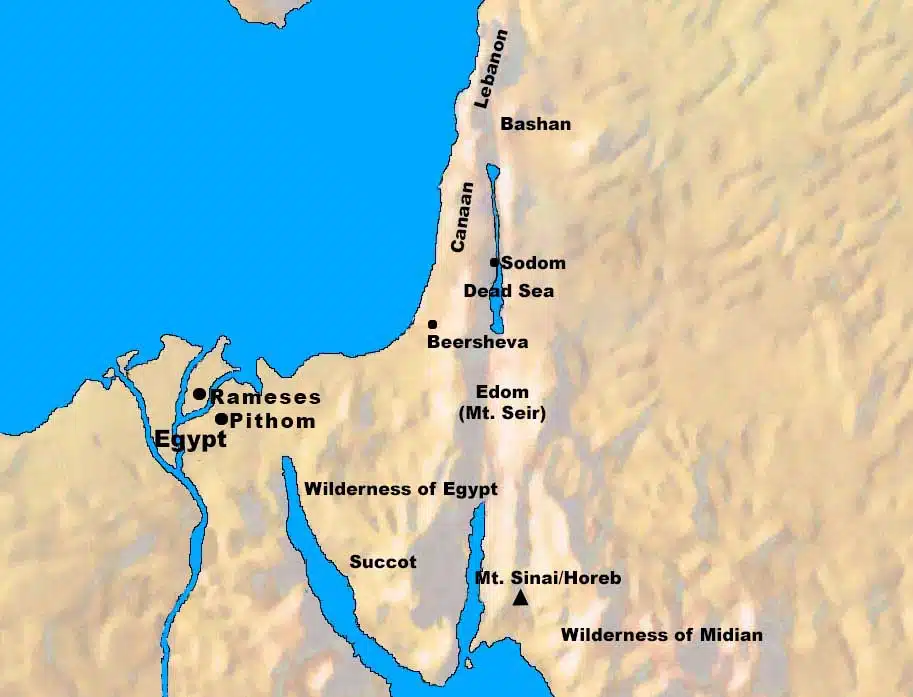Pharaoh immediately retaliated against the Israelites by making the already oppressive work even worse. He commanded that no straw be given to the Israelites, making them have to gather it themselves. On top of that, the quotas that the Israelites had to meet were not adjusted for the new task, so it simply made their plight much worse. When the daily quotas were not met, the Israelite foremen were beaten by their Egyptian taskmasters.
In verses 6 – 14, Pharaoh wasted no time penalizing the Israelites when on the same day Pharaoh commanded the taskmasters over the people and their foremen. The “taskmasters” were Egyptians that oversaw the work of the slaves. The “foremen” were Israelites that directly supervised the work and reported to the taskmasters. Pharaoh’s command was You are no longer to give the people straw to make brick as previously. This involved two things. First, let them go and gather straw for themselves. Straw was necessary for making bricks because it created a bonding agent for the bricks. Apparently, either straw was provided from farms or straw-gathering was done by other groups and given to the Israelites to make bricks. Second, the quota of bricks which they were making previously, you shall impose on them; you are not to reduce any of it. Their current quota implied that others were to gather the straw and was strenuous in and of itself. But now the workload was greatly increased by having to gather their own straw, making their situation all the more miserable. Pharaoh did this because he thought that they are lazy, therefore they cry out, ‘Let us go and sacrifice to our God.’ His action could be interpreted as saying, “If you have so much free time on your hands, then I will increase your workload.” Pharaoh stated that the Hebrews were trying to use worshipping their God as an excuse to get out of doing their work.
The purpose of this extra toil was to let the labor be heavier on the men, and let them work at it so that they will pay no attention to false words. Pharaoh probably thought that if the Israelite men were exhausted from the added workload, they would reject the leadership (Moses, Aaron, and the elders) and thus any attempts to leave Egypt. It would also create a deterrent to making such requests. The reference to “false words” is meant to discredit Moses’ as a liar and undermine his leadership.
In obedience to their king, the taskmasters of the people and their foremen went out and spoke to the people, saying, “Thus says Pharaoh, ‘I am not going to give you any straw. You go and get straw for yourselves wherever you can find it, but none of your labor will be reduced.’” So, the taskmasters and foremen informed the Israelites about the new work policy.
Now that Pharaoh’s message had worked its way down the chain of command, the people scattered through all the land of Egypt to gather stubble for straw. They really had no choice in the matter, because the taskmasters pressed them, saying, “Complete your work quota, your daily amount, just as when you had straw.” There was to be no tolerance for missing quotas in light of the new work demands. To show how serious the issue of missing quotas was, the foremen of the sons of Israel, whom Pharaoh’s taskmasters had set over them, were beaten and were asked, “Why have you not completed your required amount either yesterday or today in making brick as previously?” The people of Israel apparently could not meet the quotas of the new workload, and this resulted in the foremen being beaten.
Biblical Text
6 So the same day Pharaoh commanded the taskmasters over the people and their foremen, saying, 7 “You are no longer to give the people straw to make brick as previously; let them go and gather straw for themselves. 8 But the quota of bricks which they were making previously, you shall impose on them; you are not to reduce any of it. Because they are lazy, therefore they cry out, ‘Let us go and sacrifice to our God.’ 9 Let the labor be heavier on the men, and let them work at it so that they will pay no attention to false words.” 10 So the taskmasters of the people and their foremen went out and spoke to the people, saying, “Thus says Pharaoh, ‘I am not going to give you any straw. 11 You go and get straw for yourselves wherever you can find it, but none of your labor will be reduced.’” 12 So the people scattered through all the land of Egypt to gather stubble for straw. 13 The taskmasters pressed them, saying, “Complete your work quota, your daily amount, just as when you had straw.” 14 Moreover, the foremen of the sons of Israel, whom Pharaoh’s taskmasters had set over them, were beaten and were asked, “Why have you not completed your required amount either yesterday or today in making brick as previously?”
Check out our other commentaries:
-
Job 1:6-12 meaning
Satan appears before the throne of God after roaming the earth. God boasts about how righteous Job is. Satan scoffs, claiming that Job only fears...... -
Deuteronomy 26:16–19 meaning
Moses told the Israelites that this covenant renewal was a reminder of their special relationship with Yahweh and their special status among the nations of...... -
Exodus 11:1-3 meaning
Verses 1 – 3 contain the LORD’s resolve to bring the last and most serious plague. The nature of the plague was not specified here,...... -
Genesis 17:15-17 meaning
God changes Sarai’s name to Sarah and promises she will birth a son. Abraham laughed that a man 100 and his wife 90 years old...... -
Ecclesiastes 10:1-4 meaning
Wisdom requires making choices to act in ways that avoid emotional reactions.......



